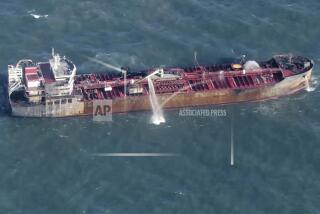U.S. Seizes Russian Ship Suspected of Carrying Iraqi Oil
- Share via
WASHINGTON — Faced with a sharp increase in smuggling of Iraqi oil in defiance of a U.N. embargo, the U.S. Navy seized a Russian-flagged tanker in the Persian Gulf and ordered it to port, where chemical tests can be made to determine the origin of its cargo, the Clinton administration said Thursday.
The Russian Foreign Ministry protested the seizure and demanded immediate release of the ship and its crew. Moscow said the cargo was from Iran, not Iraq.
However, U.S. officials said the incident was unlikely to result in much additional deterioration in the already tense Washington-Moscow relationship because the administration warned the Russians repeatedly that the ship was suspected of violating the embargo and would soon be boarded.
“We have been in regular contact with Russian officials, both here and in Moscow, for almost one month on this issue,” said State Department spokesman James B. Foley. Other administration officials said Secretary of State Madeleine Albright discussed the matter with Russian leaders during a trip to Moscow that ended Wednesday.
The Pentagon said the ship was boarded late Wednesday by personnel from the guided missile cruiser Monterey and the frigate Taylor on behalf of the multinational force that patrols the gulf to enforce the embargo imposed in 1990, after Iraq invaded Kuwait.
The tanker, Volgoneft-147, was the first Russian-flagged ship to be boarded since Aug. 31, 1998, and the first to be ordered to port since Jan. 5, 1998. The small number of interceptions indicates that Russia is only a marginal player in Iraqi oil smuggling. Last year, the multinational armada boarded 700 ships--an average of almost two a day--and diverted 19 of those to port, Foley said.
Since last fall, Foley said, the volume of smuggled oil has skyrocketed to about 100,000 barrels a day. In 1998, the average was about 50,000 barrels a day.
“We believe the recent surge in smuggling activity can be attributed, at least in part, to the increase in the price of oil,” which makes it worth the risk to try to evade the embargo, Foley said.
Adm. Craig Quigley, a Pentagon spokesman, said that after examining deck logs, communication logs and navigation equipment, the boarding party determined that the cargo, a partly refined petroleum product called gas oil, was probably from Iraq. He said the ship will be diverted to a gulf port for chemical analysis and that the captain of the tanker had been cooperative.
If the cargo is determined to be Iraqi, it will be seized and sold, with the money going into the fund that pays for the U.N.-sanctioned inspections. The crew will probably be sent home, officials said.
U.S. officials said that smugglers usually try to offload Iraqi oil in a Persian Gulf country--often Iran--where it can be mingled with other oil and sent to market. Foley said the government of the recipient country is often unaware that its ports are being used in the illicit trade.
Russia insisted that the cargo originated in Iran. Russia’s Interfax news agency quoted Deputy Foreign Minister Vasily Sredin as saying, “The Russian side resolutely insists the tanker [must be] immediately released.” He said he was “puzzled” by the seizure.
But U.S. military officials said the ship was tracked leaving Iraqi waters and followed as it sailed along the Iranian coastline.
More to Read
Sign up for Essential California
The most important California stories and recommendations in your inbox every morning.
You may occasionally receive promotional content from the Los Angeles Times.












